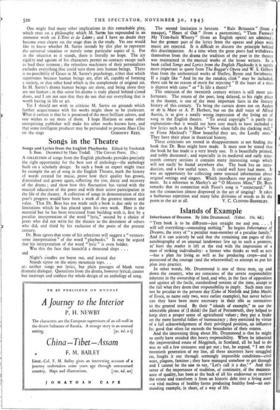Songs in the Theatre
Songs and Lyrics from the English Playbooks. Edited by Frederick S. Boas. Decorated by Hans Tisdall. (The Cresset Press. I5s.)
A COLLECTION of songs from the English playbooks provides precisely the right opportunity for the best sort of anthology—the anthology
built on a scholarly design. In such a book an expert might trace by example the art of song in the English Theatre, mark the history of words created for music, prove how their quality has grown, diminished and grown again, reflecting the rise, decay and recovery of the drama ; and show how this fluctuation has varied with the musical education of the poets and with their active participation in the life of the theatre. A collection of songs in demonstration of this poet's progress would have been a work of the greatest interest and value. That Dr. Boas has not made such a book is due only to the limitations which he has placed upon his own work. Here is the material but he has been restrained from building with it, first by a peculiar interpretation of the word "lyric," second by a choice of poets who did not write for the theatre to the detriment of others who did, and third by his exclusion of the poets of the present century.
Dr. Boas agrees that some of his selections will suggest a "venture- some interpretation" of the word " playbooks." It may be argued that his interpretation of the word " lyric " is even bolder.
Was this the face that launch'd a thousand ships . . .
ind Night's Candles are burnt out, and jocund day Stands tiptoe on the misty mountain tops. . .
ar.: neither songs nor lyrics, but plain passages of blank verse dramatic dialogue. Quotations from the drama, however lyrical, cannot but interrupt and confuse the whole design of an anthology of song
The second limitation is hesitant. "Rule Britannia ". (from a masque), "Heart of Oak" (from a pantomime), "Then Farewell My Trim-built Wherry" (from an English opera) are admitted ; but the greater part of the lyrics from the operas and plays with music are rejected. It is difficult to discern the principle behind this discrimination. At a time when the great poets had withdrawn themselves from the drama the tradition of the poet in the theatre was maintained in the musical works of the lesser writers. In a book called Songs and Lyrics from the English Playbooks it is surely more important to quote from The Beggar's Opera and W. S. Gilbert than from the untheatrical works of Shelley, Byron and Swinburne. If a jingle like "And let me the canakin clink" may be included, there can be no reason of merit for rejecting" If the heart of a man is deprest with cares" or "Is life a thorn?"
The omission of the twentieth century writers is still more un- fortunate. The return of the poet, long delayed, to his right place in the theatre, is one of the most important facts in the literary history of this century. To bring the curtain down not on Auden or de la Mare or A. P. Herbert, but on the dull voice of Alfred Austin, is to give a totally wrong impression of the living art of song in the English theatre. "To avoid copyright" is partly the explanation—but it would not have cost much to have included a few lyrics such as de la Mare's "Now silent falls the clacking mill," or Fiona Macleod's "How beautiful they are, the Lordly ones." They have their place in theatrical history.
These criticisms are rooted in disappointment at not finding the book that Dr. Boas might have made. It must now be stated that the book he has made is a very lovely one. It is beautifully printed, and nobly decorated ; and especially in its medieval and early nine- teenth century sections it contains many interesting songs which will not easily be found anywhere else. The book has an intro- duction, and a few useful notes. It could well have had more. It
was an opportunity for collecting some unusual information about i 1 original settings and singers. Which introauces one point of argu- ment. In a reference to Morley's air "0 Mistress Mine," Dr. Boas remarks that its connection with Feste's song is "conjectural." Is not the connection almost disproved in the act of singing? It takes a barbarous repetition and many false divisions of words to fit the






























 Previous page
Previous page